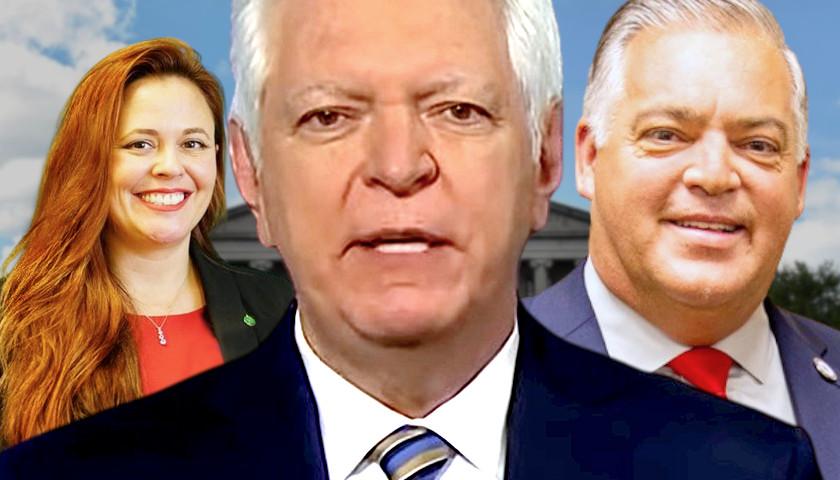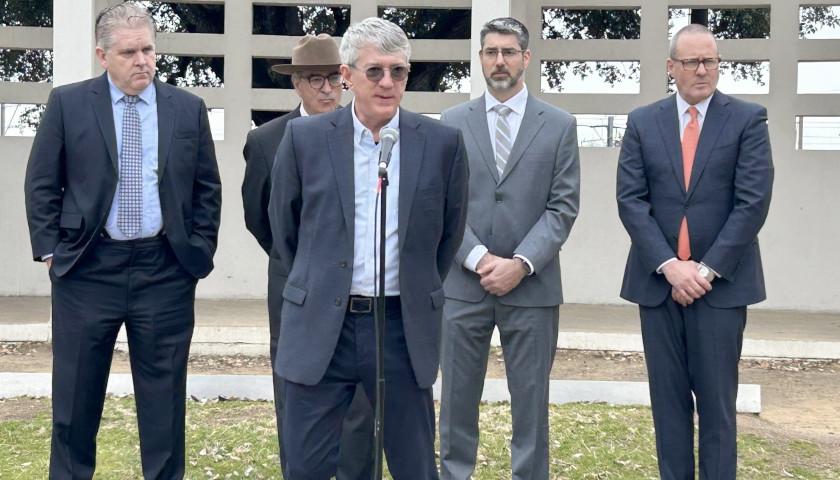Live from Music Row Thursday morning on The Tennessee Star Report with Michael Patrick Leahy – broadcast on Nashville’s Talk Radio 98.3 and 1510 WLAC weekdays from 5:00 a.m. to 8:00 a.m. – host Leahy welcomed Deborah Fisher who is the Executive Director for Tennessee Coalition for Open Government in studio to discuss the funding of large corporations, clawbacks, and the role of commissioner of Economic Community Development.
Leahy: In studio with us, our new friend, we should have met a long time ago, Deb Fisher, the executive director of the Tennessee Coalition for Open Government on the web at tcog.info.
Well, first, let me just say I am delighted that the Tennessee Coalition for Open Government exists. It’s very much needed. And thank you for all the work that you’ve been doing there.
Fisher: Thank you.
Leahy: It was founded in 2003. You’ve been the executive director since 2013. We are focusing in this hour on the details of the two bills that were passed in the special session yesterday of the Tennessee General Assembly and what can only be described as a bit of a political stampede.
Only three members of the Tennessee House of Representatives voted no on the bill. Scott Cepicky, Terry Lynn Weaver, and Tim Rudd from Murfreesboro. Hats off to all three of those people, in my view.
And then in the state Senate, only four state senators out of 33 voted against Janice Bowling of Tullahoma, Joey Hensley of Hohenwald, Mark Pody of Lebanon, and Kerry Roberts of Springfield.
All frequent guests here on The Tennessee Star Report. Hats off to them as well. Personally, I think they made the right decision, but there was a political stampede there. And what I’m concerned about and I wanted to talk to Deb Fisher, the executive director in studio with the Tennessee Coalition for Open Government.
I’m going to read this part of our lead story about this. The spending bill totaled $884 that was approved yesterday includes $500 million in incentives for Ford related to the completion of the project. $138 million to the Regional Megasite for infrastructure, demolition of structures, and more.
And the funding of the project is supposed to come out of the state’s $2 billion in reserves. We’ve got the reserves. That’s a good thing. What they did is they appropriated those funds, which they hadn’t appropriated for this purpose. Senator Bo Watson, Republican from Hickson, said.
Now, this is where we get into the details, Deb. I want to bring you in on this. The $500 million incentive will be paid as Ford submits expenses related to the project.
Ford will also have the option to become the owner of the 3,600 acres after ten years and would then be required to pay local property taxes. The way the deal works is, there would be “clawback provisions.”
Clawback provisions were purportedly 10 years from today, if they don’t hire 1,800 workers or 90 percent of those 5,800 workers for a period of a year in that 10th year, some of that money will be given back to state taxpayers, but we don’t have any of the details on that. Do they give any details on this agreement?
Fisher: They shared some details in answer to questions from lawmakers. Yesterday, I was in the House Commerce Committee and heard a lot of information about what was in the memo of understanding with Ford. But of course, the document itself is not available to the public or really to lawmakers.
Leahy: Well, hold on just a minute. We want to focus on that a minute. The memorandum of understanding that lays out the terms by which Tennessee taxpayers will write a check to forward in its subsidiaries $500 million, we don’t know when those checks will be written. And we don’t know the provisions of the so-called clawback.
Fisher: Right. And really, it’s actually is much more than $500 million. That’s just part of the deal. And that’s just the capital grant. And as they submit expenses, the authority will reimburse them. But there’s really much more to it.
The pilot agreement, which is a payment in lieu of taxes, how much it goes to the local government, how much doesn’t?
Leahy: So is it more than $884 million?
Fisher: It was interesting to hear lawmakers asking this question, trying to get a total amount. And no, it is more, but it’s in different pieces.
Leahy: Again, this is what’s troubling to me. They do break down. It purported an $884 million, a $500 million incentive for Ford related to the completion of the project.
$138 million to the Memphis Regional Megasite for infrastructure, demolition of structures, and more than $138 will go to this Megasite group managed by this 11 board for things that I think Ford ought to be paying for.
Then there’s $40 million for this college. And then $200 million for construction on state roads 194. Then another $5 million for consulting and less than a million to create the Megasite Authority of West Tennessee. I think that adds up to $884. But you’re telling me it’s more than that.
Fisher: Well, right. This is a good deal for Ford. They will have in addition to that, a lot of franchise tax credits related to job creation and so forth. The problem with ECD.
Leahy: ECD is the Economic Community Development run by Bob Rolfe. Previously, the other previous people held that job. Randy Boyd ran for governor, lost. He was head there.
And then before that, Senator Bill Hagerty, who became an ambassador of Japan and now is a U.S. Senator. Some high-powered people in that job, right. And the mission of that group is what?
Fisher: It’s to promote economic development.
Leahy: Can I interject?
Fisher: Yes.
Leahy: Is it to promote economic development or is it to give corporate welfare to Fortune 500 companies?
Fisher: I think people have different viewpoints about that. (Leahy laughs) But let me say something about the clawback. Let me say something about the clawbacks.
Lawmakers have been trying to get some insight into this. They first started at putting legislation in 2013, two Democratic lawmakers carry the bill to require clawback in these contracts.
Leahy: When we say clawback. That’s a very colorful term, right. It suggests somebody with their fingers out clawing back the money. If you don’t honor the promise we’re giving you $500 million, we are going to get our fingers out.
We’re going to claw back that $500 million. And the impression is, well, if you hit 50 percent of the goals, we’re going to claw back $250 million. Is that how it works? You’re shaking your head?
Fisher: No, I sometimes call them pawbacks (Leahy laughs) Listen, we got the first report this year. The only reason we got the report is that some lawmakers passed a law report.
Leahy: From what report?
Fisher: From ECD on how many clawbacks they’ve executed and which ones have been in default and not repaid. When a company has trouble and doesn’t meet its obligations and either capital investment that they’ve promised or jobs created, it’s very hard to get money back from them.
Leahy: You can’t get…
Fisher: Blood from a turnip.
Leahy: There you go. You took the phrase right out of my mouth.
Fisher: I think those clawback agreements are important because they reserve the right for the state to get some or all of these capital grants. Remember, it’s not a clawback for everything like tax credits and so forth. It’s a clawback for the portions.
Leahy: To build a building, to do some construction or whatever. But let me just say. Why is it that the Economic Development Administration, until recently never provided information about all these big corporate giveaways that are supposed to have clawback? And why only now are we getting one report on that?
Fisher: That would be something you would ask them. They have a lot of information. It’s like anything. They want to promote their successes. They know and I’m sure they keep a dashboard on what doesn’t go so well. But lawmakers wanted to be able to assess these deals better, and they wanted to see how this was going. So there is this new report that has to be provided.
Leahy: A law was passed when? Just recently.
Fisher: There’s been several, but one was passed in 2020 to require some transparency.
Leahy: And who were the sponsors of that bill?
Fisher: The sponsors were Representative Clark Boyd, I think, from Lebanon. And John Lumberg up in East Tennessee.
Leahy: Oh, very good. John’s, he’s a good guy.
Fisher: And there were some co-sponsors, Hazelwood and Senator Bell.
Leahy: Senator Bell, good guy. He sat in the very chair you’re sitting in right now. Way back when. So now they say, okay, give us a report on these clawbacks to show the efficacy of all these corporate giveaways? When was that report released?
Fisher: The first report was July 15th as far as I can see.
Leahy: Of this year.
Listen to the full second hour here:
– – –
Tune in weekdays from 5:00 – 8:00 a.m. to the Tennessee Star Report with Michael Patrick Leahy on Talk Radio 98.3 FM WLAC 1510. Listen online at iHeart Radio.




